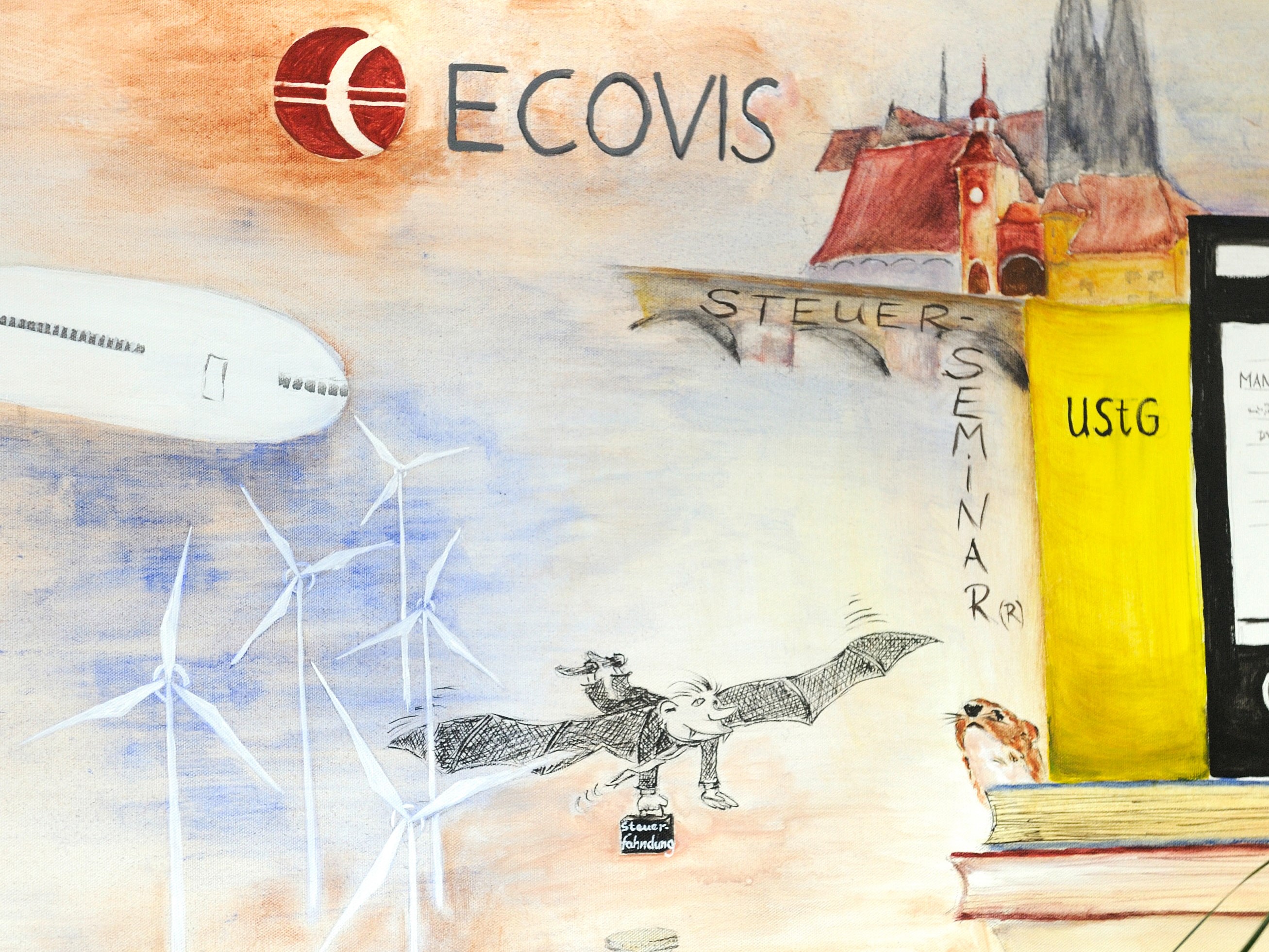
FRAMEWORK FOR DOING BUSINESS IN THE CZECH REPUBLIC IN 2025
ECOVIS Doing Business in the Czech Republic 2025
CZECH REPUBLIC IN SIMPLE FACTS
The Czech Republic is a Central European state bordered by Germany (west), Austria (south), Slovakia (east) and Poland (northeast).
State system is a multi-party parliamentary representative democracy, with the Prime Minister as the head of government. The President, as the formal head of state with some limited executive powers, is directly voted by general elections. The Parliament is bicameral, with the Chamber of Deputies (200 members) and the Senate (81 members). As a democratic country, it’s a member of many international organizations such as United Nations, EU, NATO and many more.
Main industries of the Czech Republic are engineering (mainly automotive), chemical industry, food industry, metallurgical industry, energy industry and construction industry. The country’s economic policy is consistent and predictable. A strong and independent central bank (the Czech National Bank) has maintained an extraordinary degree of currency stability since 1991. The Czech koruna is fully convertible.
The Czech Republic has concluded agreements for the avoidance of double taxation. No limitations exist concerning the distribution and expatriation of profits by Czech subsidiaries to their foreign parent companies.
An open investment climate has been a key element of the Czech Republic's economic transition. The country's investment grade ratings from international credit-rating agencies and its early membership in the OECD testify to its positive economic fundamentals.
Investment Risk Ratings of the Czech Republic:
Standard & Poor´s AA-
Moody´s analytics Aa3
Fitch Ratings AA-
Source: Czech National Bank, 2025
Main economic indicators of the Czech Republic:
| Indicators | 2017 | 2018 | 2019 | 2020 | 2021 | 2022 | 2023 | 2024 | 2025* |
|---|---|---|---|---|---|---|---|---|---|
| GDP growth (constant prices, %) | 5.2 | 3.2 | 3.6 | -5.3 | 4.0 | 2.8 | - 0.1 | 1.1 | 2.3 |
| General Government debt (% GDP) | 34.2 | 32.1 | 29.6 | 36.9 | 40.7 | 42.5 | 42.8 | 43.4 | 44.3 |
| Average inflation rate (%) | 2.5 | 2.1 | 2.8 | 3.2 | 3.8 | 15.1 | 10.7 | 2.4 | 2.3 |
| Unemployment rate (avg., %) | 2.9 | 2.2 | 2.0 | 2.6 | 2.8 | 2.2 | 2.6 | 2.6 | 2.5 |
| Average nominal monthly gross wage (CZK) | 29,638 | 32,051 | 34,578 | 36,176 | 38,277 | 39,932 | 43,120 | 46,156 | 49,149 |
| Exchange rate – CZK/EUR (avg.) | 26.3 | 25.6 | 25.7 | 26.4 | 25.6 | 24.6 | 24.0 | 25.1 | 25.1 |
*Forecast
Quality of Life
The Czech Republic ranks 22nd of 149 countries in the worldwide quality-of-life index and has the best result among the countries of Central and Eastern Europe.
Education System
The Czech Republic combines a good level of general education with strong science and engineering disciplines. For generations the Czech education system has generated high-level, technical problem-solving skills in environments where standard solutions are inadequate.
School attendance is compulsory from ages 6 to 15 (elementary and lower secondary school). After nine years, students may continue at three basic types of upper secondary school: vocational training centres, secondary schools and high schools (gymnazium). Undergraduate studies are offered by colleges (offering three to four-year bachelor programmes) and universities, which also offer master and doctoral programmes.
Labour Market
The Labour market in the Czech Republic, as well as the economy and industry, have a very regional character. The lowest unemployment rate, the highest number of job opportunities, and the highest average salaries are traditionally found in the capital of Prague and in the Central Bohemia Region. On the other hand, these rates are the worst in the Ústí nad Labem and Moravia-Silesia Regions.
General social and health security payments (employees)
| Contribution for | Maximum base per year | Employee | Employer | Sole entrepreneur |
|---|---|---|---|---|
| Pension insurance | CZK 2,234,736 (approx. EUR 89,390) | 6.5% | 21.5% | 28% |
| Sickness insurance | - | 0.6% | 2.1% | 2.7% (voluntary) |
| Unemployment insurance | - | N/A | 1.2% | 1.2% |
| Health insurance | - | 4.5% | 9% | 13.5% |
| TOTAL | - | 11.6% | 33.8% | 45.4% |
The system of taxation described below is derived from the Czech tax legislation effective on 1 January 2025. The current tax system was introduced in January 1993. The legislation is subject to frequent amendments and changes due to rapid developments in the economy.
Taxation of self-employment in Czech Republic 2025
| Self-employment Agreement CZK | Base gross salary for calculation CZK | Social Security | Health Insurance | Tax example | Tax after deduction of the taxpayer's discount | Total cost |
|---|---|---|---|---|---|---|
| Self-employed | 50 000 100 000 150 000 | 4 820 9 640 14 450 | 2 970 4 050 6 080 | 60 000 100 000 130 000 | 2.830 6.430 9.130 | 10.620 20.120 29.660 |
| Self-employment Agreement EUR | Base gross salary for calculation EUR | Social Security | Health Insurance | Tax example | Tax after deduction of the taxpayer's discount | Total cost |
| Self-employed | 2 000 4 000 6 000 | 193 386 578 | 119 162 243 | 2 500 4 167 5 417 | 113 257 365 | 425 805 1.186 |
Taxation of employment in Czech Republic in 2025
| Employment Agreement CZK | Base gross salary for calculation CZK | Social insurance employee | Social insurance employer | Health insurance employee | Health insurance employer | Tax after deduction of the taxpayer's discount | Total cost employee | Total cost employer |
|---|---|---|---|---|---|---|---|---|
| Employee | 50 000 100 000 150 000 | 3 550 7 100 10 650 | 12 400 24 800 37 200 | 2 250 4 500 6 750 | 4.500 9.000 13.500 | 4.930 12.430 20.756 | 10.730 24.030 38.156 | 16.900 33.800 50.700 |
| Employment Agreeement EUR | Base gross salary for calculation EUR | Social insurance employee | Social insurance employer | Health insurance employee | Health insurance employer | Tax after deduction of the taxpayer's discoun | Total cost employee | Total cost employer |
| Employee | 2 000 4 000 6 000 | 142 284 426 | 496 992 1 488 | 90 180 270 | 180 360 540 | 197,2 497,2 830,2 | 429,2 961,2 1.526,2 | 704 1.408 2.113 |
Minimum compulsory Czech social security advance payments for self-employed persons in 2025
Monthly advance payments for Czech social insurance in 2024 amounted to a minimum of CZK 3.852.
Newly, these advance payments rise by CZK 907 to CZK 4.759. You must pay a new amount of your social
security deposit no later than the month in which you report your income and expenses for 2024. As the
rules for prepayment are changed from 2019 onwards, so the first time the higher premium amount must leave your account is in April, May or June 2025, depending on when you file your statement. Under the new rules,
the deposit is due during the calendar month for which it is paid.
Starting in 2025, self-employed persons will now pay reduced social insurance contributions. This relief applies in the first three years of business (year of start-up + next two years).
Minimum mandatory advance payments for Czech health insurance for self-employed persons 2025
Minimum advance payments for Czech health insurance for 2025 increase from CZK 2,968 by CZK 175
to CZK 3,143. Compared to social insurance for health insurance, it is true that increased advances have
to be paid from the beginning of the new year, i.e. from January 2025.
Tax system in Czech Republic
CORPORATE INCOME TAX AND PERSONAL INCOME TAX
Czech tax residents are subject to income tax on their worldwide income, while Czech tax non-residents are taxed only on their income from Czech sources.
An individual is a Czech tax resident if he/she has his/her permanent address in the Czech Republic (i.e., a place where an individual has his/her home and circumstances indicate his/her intention to dwell there permanently) or has “a usual residence” in the Czech Republic (i.e., the individual’s total number of days spent in the Czech Republic is at least 183 days per calendar year).
A legal entity is tax resident of the Czech Republic if its registered office or place of effective management is in the Czech Republic.
The standard rate of Czech corporate income tax is 21%. For ‘Czech basic investment funds’ a reduced 5% corporate income tax rate applies; for pension funds a zero per cent corporate income tax rate applies.
Certain types of payments such as dividends, interest or royalties are subject to withholding tax. Withholding tax rates in Czech Republic range from 5% to 35% depending on the type of income. Furthermore, the withholding-tax rate may be reduced under a double taxation treaty concluded between the Czech Republic and the country where the recipient of the payment is a tax resident. As of mid-2018, the Czech Republic has concluded double-taxation treaties with more than 80 countries. Exemptions under a treaty can be applied ‘automatically’ and it are not subject to notification or approval of the Czech tax authorities.
Losses incurred can be carried forward for five subsequent tax periods and it is up to the¬ taxpayer when such losses are actually utilised against taxable profits within this five-year period. Companies that have received investment incentives in the form of tax relief must utilize all previous losses against declared profits before they may claim the tax relief.
Generally, taxpayers must file tax returns within three months following the end of the respective tax period. Czech legal entities that are required to prepare audited financial statements or whose tax return is signed and filed by a registered tax advisor on the basis of a power of attorney must file their tax returns within six months following the end of the tax period.
Accounting in Czech Republic
The Czech accounting system is based on the double-entry bookkeeping and is largely consistent with the International Financial Reporting Standards with certain minor difference regarding, for example, financial leasing and depreciation of fixed assets.
Effective 1 January 2016, new classification of companies has been introduced:
| Company | Net turnover (CZK) | Net assets (CZK) | Employees Criteria | |
|---|---|---|---|---|
| Micro | 18 million | 9 million | 10 | 2 of 3 |
| Small | 200 million | 100 million | 50 | 2 of 3 |
| Medium | 1 000 million | 500 million | 250 | 2 of 3 |
| Big | above 1 000 million | above 500 million | above 250 |
Statutory Audit
Statutory audit is always required for big and medium companies. Small companies shall qualify for the statutory audit based on the following criteria:
- legal form of joint-stock company
- at least one of the following criteria is fulfilled as at the balance sheet day of the current and immediately preceding accounting period:
· net assets CZK 40 million
· net turnover CZK 80 million
· employees headcount 50
Other small companies shall qualify for the statutory audit assuming at least two of three of the above criteria are fulfilled as at the balance sheet day of the current and immediately preceding accounting period. Companies that have issued securities traded on regulated stock exchanges in EU member states (e.g., shares, bonds) should apply the International Financial Reporting Standards when preparing their annual financial statements and consolidated financial statements. However, for calculation of corporate income tax, the accounting result must be calculated based on the Czech Accounting Standards and unaffected by the International Financial Reporting Standards.
1. What kind of forms of business activities are allowed in the Czech Republic in the year 2025?
Czech or foreign natural persons or legal entities can perform the business activity in the Czech Republic if they comply with the Czech law. The condition is generally the issuance of a Czech trade license regulated by the Trade Licensing Act or another specific permit regulated by a number of specific acts, depending on the type of business activity. The exception from this condition applies to entrepreneurs from another EU member state in case of temporarily provision of services based on the trade licenses issued in such member state.
Natural persons as entrepreneurs
A natural person or entrepreneur is, according to Czech law, a person who conducts business on the grounds of a trade licence, a person who conducts business using a special licence, or a person who practises agriculture and is registered according to a special regulation.
Citizens of other countries are allowed to conduct business in the Czech Republic under exactly the same conditions and to the same extent as Czech citizens, unless the law says otherwise. For this purpose, the term foreign person applies to a natural person whose permanent residence is outside of the Czech Republic. Therefore, it is permanent residence, and not citizenship, that is decisive here. Visa are required in certain cases.
Conducting business with a trade licence
According to the Trade Licensing Act (Act No. 455/1991 Coll.), the business activity is conducted systematically, individually, using one's own name, on one's own responsibility, with a view to make profit and under the conditions laid down under this law. The different professions requiring a trade licence are listed in appendices 1- 4 of the Trade Licensing Act.
The Trade Licensing Act differentiates between notifiable trades, where the licence is granted once the agreed conditions are met and the Trade Office is notified, and concessionary trades, which require state permission - i.e. the granting of a concession; this is not accorded automatically. Notifiable trades are further divided into skilled, restricted and free trades. Every natural person who is considering pursuing a trade must meet a set of general conditions, including being 18 years old and above, having legal capacity and being a person of good character. In the case of restricted, skilled and concessionary trades, a natural person is additionally obliged to meet special conditions - a professional qualification or other competence as defined by the law for each profession. In case of non-compliance with these special conditions, a natural person is obliged to conduct a trade through the intermediary of a responsible representative, who is obliged to meet both the general and the special conditions pertaining to the given type of trade. Access to the Trade Register is free and available online at www.rzp.cz.
Conducting business using a special licence
The different business objects for the given category are the professions listed in Section 3 of the Trade Licensing Act, and which are exempt from its provisions. First and foremost, this applies to professional services (doctors, advocates, expert witnesses, auditors, tax advisers, dentists, etc.). Conditions for each of these professions are specifically defined by separate laws.
Practice of agriculture
The third type of natural persons encompasses persons who practise agriculture and who are registered under a special regulation - the Agriculture Act (Act No. 252/1997 Coll.).
Agriculture includes forestry and water resource management. An agricultural entrepreneur is any person who practises agriculture for profit and meets the agreed conditions, including being at least 18 years of age, having legal capacity and Czech or EU citizenship - all other natural persons need permanent residence in the Czech Republic and a certification of a basic knowledge of the Czech language.
Legal entities
The Act on Business Corporations recognises the following types of business entities:
· limited liability companies
· joint-stock companies
· general partnerships
· limited partnerships
· co-operatives
· Societas Europaea (European companies)
· European Economic Interest Grouping (EEIG).
The Czech Civil Code recognises also other forms of legal entities, such as trust and associations, which can also perform business activity, but this should not be the main purpose of their existence.
A Czech legal entity is an entity that has its registered office in the Czech Republic. Commercial companies are formed in two stages. The first stage involves founding the company and the second stage involves establishing it as a legal person, as of the date of its entry in the Commercial Register. The Commercial Register is maintained by the courts. Only after registration in the Commercial Register the company is entitled to commence its business activity in the Czech Republic. Access to the Commercial Register is free and available online at www.justice.cz.
Branch office
A branch office is merely an organizational unit of the founding company and it is not regarded as a separate legal entity and does not have its own legal capacity. It is an entity legally dependent on its head office, although it has an independent management and their own accounts. The branch office must be registered in the Commercial Register and the founder must appoint a director of the branch office who acts on behalf of the founding company, but this is only in relation to matters concerning the branch office.
In case of commencement of any business activity in the Czech Republic (i.e., continuous business activity carried out independently and aimed at generating a profit) it is important to ensure, that the respective trade licenses or other permits in the Czech Republic are obtained and registration with the Czech Commercial Register is performed.
2. Steps for Acquiring a Czech Trade Licence in the year 2025
Brief description of legal steps for acquiring a Czech Trade Licence in the year 2025
Trades are divided under the Czech Trades Licensing Act (Act No. 455/1991 Coll.) into notifiable trades, which can be obtained based on notification, and concession trades, which can only be pursued on the basis of a special business licence - a concession. Notifiable trades are categorised into three further groups: vocational, professional and unqualified.
Notifiable trades are characterised by the fact that the authorisation to trade becomes valid immediately at the very moment of notification (not later when the trade licence is issued).
To illustrate the various types of trade, here are a few examples. Trades categorised as vocational include carpentry, bakery and confectionary, bricklaying and plastering, brewing, etc. Professional trades include activities such as providing or brokering consumer credit, work as an optician, or animals trading.
In order to acquire the concession for concessionary trades, it is necessary to demonstrate the relevant professional eligibility and in some cases to also meet some additional requirements. Trades that require concessions include operating a travel agency, road freight transport or a security firm employed to protect other people's property.
Those interested in a licence for a notifiable trade can obtain one by notifying the trade, while applicants for a concession can submit their application at one of the general Trade Offices - central registration points, by means of government administration contact points (Czech-Point) or do so electronically using the Trade Register web system. Trades are notified and applications for concessions are submitted using a standard registration form. Forms can be obtained at any trade office, and in most cases are freely available at the Ministry of Industry and Trade website https://mpo.gov.cz/en/business/licensed-trades/guide-to-licensed-trades-important-contacts/ (forms must be completed in Czech).
General conditions for pursuing a trade
The general conditions applying to a natural person pursuing a trade are: to have reached the age of 18 years, to have full legal capacity and a clean criminal record. According to the Act, a person with a clean criminal record is someone who has not been finally convicted of intentionally committing a criminal act, if it was committed in connection with business activities, or with the business object for which they are applying or notifying, unless they are now considered as not having been convicted of such offence.
Professional eligibility
Alongside the form, in the case of a professional or vocational trade or concession, the notifier or applicant must submit a document attesting its professional eligibility for the relevant trade, or of the appointed responsible representative, together with his/her signed declaration that he/she consents to the appointment. The signature on the declaration must be officially certified. If documents are in a foreign language, they must be translated into Czech by a sworn translator (a list can be found at https://seznat.justice.cz/), with the exception of documents submitted by nationals of EU Members States or by a legal entity with its registered office, central administration or principal place of business activities in an EU Member State, unless there are doubts as to the translation's correctness.
Other terms and conditions
Further, a document attesting the legal basis for use of the premises on which the trader has located its place of business (e.g. a lease contract) must be submitted, and also a receipt for payment of the administrative fee, which is 1,000 CZK (40 EUR) for a notifiable trade (if multiple trades are notified simultaneously the fee is charged only once) must be sumbitted. A foreign natural persons, except for nationals of EU Member States or of a State Party to the Agreement on the European Economic Area, or the Swiss Confederation, must attach to their notification of a trade or concession application a document corroborating that they have been granted a visa to stay longer than 90 days or have had their long-term residency permit. A foreign natural person must further provide an extract from the criminal register or equivalent document issued by the relevant court or state authority of the country of which the individual is a national; the extract must not be more than three months old.
The Trade Office is obliged to make the entry into the Trade Register within 5 business days of receiving the notification and issue the entrepreneur an extract if the notifier meets the conditions set out in the Trades Licensing Act. Where concessions are concerned, the Trade Office shall decide the matter within 30 days of receiving the application, provided that all of the relevant particulars are met. Subsequently, within 5 business days of the decision granting the concession having come into effect, an entry is made in the Trade Register and an extract is issued to the entrepreneur.
3. Doing business without trade licence in Czech Republic
The Czech Czech Trade Licensing Act
In Czech Republic, it is possible to be an entrepreneur even without being required to have a trade licence granted by the Czech Trade Licensing Office. However, the range of activities which might be performed without traded licence is limited mainly by the Czech Act No. 455/1991 Coll., the Trade Licencing Act as amended (the “Czech Trade Licensing Act”).
List of activities that are not trades in Czech Republic
In the Section 3 of the Czech Trade Licensing Act you can find list of activities that are not trades. Paragraph 1 of this Section describes 5 activities and those are operation of an activity reserved by the act to the state or designated to legal person:
a) the performance of an activity statutorily reserved for the State or for a designated legal person,
b) the use of the results of intellectual creativity protected by specific laws, their originators or authors,
c) the collective administration of copyright and rights related to copyright in accordance with specific legislation,
d) the restoration of cultural monuments or parts thereof which are works of fine art or applied art,
e) the performance of archaeological research.
All these activities are adjusted by other acts especially all activities related to the copyright are adjusted by the Czech Act No. 121/2000 Coll., the Copyright Act.
Activities of natural persons within the scope of special acts in Czech Republic
Entrepreneurial activitities of natural persons within the scope of special Czech acts. Those are for example:
a) doctors, dental practitioners and pharmacists, paramedical workers in the provision of health services, and natural healers,
b) veterinary surgeons, other veterinary workers, including rendering workers and persons performing professional activities related to selection work and the breeding of livestock,
c) lawyers, notaries and patent attorneys and bailiffs,
d) experts and interpreters,
e) auditors and tax consultants,
f) stock jobbers,
g) mediators and arbitrators in collective bargaining disputes and arbitrators in property disputes,
h) officially licenced surveyors,
i) authorised architects and authorised engineers active in construction who engage in activities as freelance architects and freelance engineers,
j) authorised inspectors who engage in their activities as a liberal profession,
k) road safety auditors,
l) mediators registered under the Act on Mediation.
Further, the following activities shall also not constitute a trade in Czech Republic:
a) banking activities, providers of payment services, issuing electronic money, operating payment systems with irrevocable settlement, currency exchange activities, insurance activities, security funds, insurance brokers or accredited persons according to the Act on Insurance and Reinsurance Distribution, pension funds, pension companies, savings and loans societies, commodities markets, organisers of regulated markets, securities traders and their bound representatives and the activities of persons involved in the management or administration of an investment fund or foreign investment fund and the activities of persons providing settlement of securities, the activities of persons accepting and giving instructions or investment advisory activities relating to investment tools under the conditions set form in a special Act and their bound representatives, and the activities of credit rating agencies, the activities of providers of reporting services, the activities of accredited persons according to the Act on Capital Market Undertaking, provision and intermediation of consumer credit and the activity of accredited persons under the Act on consumer credit,
b) operating games of chance,
c) mining and other activities using mining techniques,
d) the generation of electricity, the production of gas, the transmission of electricity, the transmission of gas, the distribution of electricity, the distribution of gas, the storage of gas, trade in electricity, trade in gas, the production of heat and the distribution of heat, which are subject to a licence under specific legislation,
e) agriculture, including sales of unprocessed agricultural products for the processing or resale thereof, with the exception of professional phytosanitary care,
f) sales of unprocessed plant and animal products from natural persons’ internal small-scale cultivation and breeding,
g) maritime shipping and sea fishing,
h) the operation of railways and rail transport,
i) the performance of communication activities in accordance with specific legislation,
j) research, production and distribution of medicinal products,
k) the handling of addictive substances, products containing them, and certain substances used in the production or processing of addictive substances under a specific law,
l) the activity of authorised or accredited persons and notified subjects in the field of state testing,
m) foreign trade in military material,
n) the performance of labour inspections,
o) radio and television broadcasting,
p) the offer or provision of services for the direct gratification of sexual needs,
r) the intermediation of employment,
s) the operation of technical inspection centres,
t) education and training in schools, preschool and educational establishments included in the register of schools and educational establishments, education in bachelor, master and doctoral studies, and lifelong learning programmes in accordance with specific legislation,
u) the handling of highly dangerous substances,
v) the operation of airports, the operation of commercial air transport and aeronautical work, the provision of air services, activity of executive pilots and the provision of professional training in the field of protection of civil aviation against illegal acts,
x) the activities of organisations set up under specific legislation conducted in accordance with the purpose for which they were established,
y) child protection by legal and natural persons, if authorised to provide child protection under specific legislation,
z) the prospecting, exploration and production of mineral resources from and beneath the sea bed and the ocean bed beyond State territorial limits,
aa) the operation of cemeteries,
ab) the activities of authorised packaging companies in accordance with specific legislation,
ac) the handling of high-risk and risky biological agents and toxins,
ad) the operation of zoological gardens pursuant to a licence issued by the Ministry of the Environment,
ae) archiving,
af) the provision of social services in accordance with specific legislation,
ag) the activities of authorised persons entitled to verify professional competence required to obtain a certificate of a professional qualification under a specific law,
ah) the letting of property, residential and non-residential premises,
ai) providing of health services,
aj) the performance of professional plant health care activities in accordance with specific legislation,
ak) operation of postal services and foreign postal services pursuant to a special legal regulation,
al) the performance of the expert activities of experts, expert offices and expert institutes,
am) the activities of the operators of collective systems pursuant to the Act on end-of-life products and the Act on limiting the environmental impact of selected plastic products.
Regulation by other Czech acts
All activities listed in the Section 3 of the Czech Trade Licensing Act that are not trades are all regulated by other acts, it means that you do not need a trade license for you business in case of these activities but you still have to comply legal regulation. Acts often define other duties you have to fulfil. As an example according to the Copyright Act the collective manager must apply for an authorization to execute collective management. The Ministry of Culture then decides on the authorization. Another example is activity from paragraph 3 letter e) - agriculture, including the sale of unprocessed agricultural products for processing or resale unless it is the operation of professional activities in the field of phytosanitary care. Again you don´t need a trade license here but the Czech Act No. 252/1997 Coll., the Act on Agriculture, Section 2f determines duty to register if the farmer meets the conditions for the agricultural entrepreneur referred to in Section 2e.
4. Incorporating a Czech Limited Liability Company in the year 2024
The limited liability company is the most common form of business corporation in the Czech Republic. How to establish such company?
A limited liability company is established by a Memorandum of Association, which is signed by all the founders, i.e. the future shareholders or just one future shareholder. In both cases, it is essential that it is executed in a form of notarial deed of a Czech notary. The notary fee usually does not exceed CZK 5,000 (180 EUR) and is depending on the amount of the registered capital. In case of basic Memorandum of Association which contains only the mandatory provisions required by the Civil Code and Business Corporations Act und if all contributions to the registered capital will be monetary and registration of the company to the Commercial Register will be performed by the notary, the notary fee was decreased to CZK 2,000 (75 EUR).
The founding deed must contain basic information about the company, e.g. the business name, registered address, identification of the shareholders, types of business interests (shares) held by each shareholder and specification of rights and obligations attached to such business interests (assuming various types of business interests are allowed), list of company's business activities, number of executives and how they will act on behalf of the company, amount of registered capital, amount of contribution of each shareholder to the company's registered capital, identification of the initial executives and appointment of contribution administrator.
The business name must not be interchangeable with any already existing name of another company registered in the Commercial Register. This is why the business name being considered by the founders should be checked out in this regard in advance at the website www.justice.cz. If the company's business name contains the name of a living natural person, the founders must obtain the consent of such person.
Obtaining a business licence
Once the founding deed was drawn up, the initial executives need to obtain the trade license at the Trade License Office unless the company's business activity includes only management of own property, letting of real estate, residential units and non-residential units or a special permit is required. The administration fee for obtaining the trade license at the Trade License Office amounts to CZK 1,000 (EUR 40).
Business interests
The founding deed of the limited liability company may allow formation of various types of business interests (shares) held by shareholders of the company. Furthermore, the business interest of the shareholder could be represented by a common certificate issued as registered security. Shareholders of the limited liability company can own more than one business interest in the company.
Registered capital and payment of contributions into the registered capital
The minimum requirement for the registered capital of the limited liability company is CZK 1. However, it is recommended that founders agree on the higher amount of the company's registered capital than the minimum amount.
A shareholder's contribution into the registered capital is either in monetary or in-kind form whereas all contributions of founders are administered by the contribution administrator who is usually one of the founders. Monetary contributions are deposited to a special bank account established for this purpose. The in-kind contributions must be appraised in the expert's opinion drafted by the expert chosen by the founders from the official list of experts. Before submitting the application for entry the company into the Commercial Register, any in-kind contribution must be fully paid up, while at least contribution premium (if any) and 30% of each monetary contribution must be paid.
Entry of the company into the Commercial Register
The application for entry of the company into the Commercial Register has to be submitted either by all executives of the company on the prescribed form with their officially verified signatures or the registration can be performed through the notary who can register the company into the Commercial Register directly. The application must be submitted to the competent court depending on the location of the company's registered office within 6 months from the foundation of the company; otherwise the founding deed is considered as withdrawn. The founding deed may stipulate another period.
The registration court fee amounts to CZK 6,000. The fee amounts only to CZK 2,700 (EUR 100), if the registration is performed by the notary on the basis on the notarial deed which would contains only mandatory provisions and all contributions to the registered capital of the Company would be monetary the registration of the company is for free.
Irrespective whether the application is submitted by the company's executives or through the notary, the following documents must usually be presented:
- a notarial deed containing the founding deed,
- a trade licence or licence for other type of business activity,
- a deed attesting the legal basis for use of the premises at which the company's registered office is situated, e.g. a written consent of the owner (such consent may not be older than 3 months and signatures on the document must be legally certified), together with the decision of the company's statutory body on the company's registered office location,
- a document attesting the fulfilment of the obligation to pay prescribed contributions into the registered capital. This fact could be proved by a declaration of the contribution administrator and confirmation from the bank that the relevant monetary sums have been credited to the bank account of the company,
- documents attesting the fact that persons who are to be registered as members of the company's bodies satisfy the requirements set forth by law, i.e. that they are at least 18 years old, have legal capacity, are without a criminal record related to the business, and that there are no impediments to their operating of a trade in accordance with the Trades Licensing Act and other legal regulations (such as an affidavit concerning such facts and an extract from the criminal record or equivalent document issued by the relevant authority of the EU Member State in which they were last residents in the case of citizens from another than EU Member State)
- the consent of the person being registered to their registration in the Commercial Register.
The necessary forms for entering the company into the Commercial Register can be found in Czech on the website of the Czech Ministry of Justice https://or.justice.cz/ias/iform/index.html?0. Documents presented to the Commercial Register must be in Czech, including all their attachments; any deeds in a foreign language must have a legally certified translation unless it is drawn up in one of the official languages of the European Union (in that case a simple translation is sufficient). For certain types of foreign deeds (e.g. an extract from a criminal register or commercial register) a special form of higher authentication is required, one that certifies the authenticity of the issuing authority, generally identified as an apostille or ‘super-legalisation', depending on whether the country issuing the deed is a signatory to the so-called Hague Apostille Convention.
The statutory deadline for registration of the company is five working days from submission of the application. If, within this period, the court does not register the company or request additional documents from the applicants, the company is considered as registered. The notary can register the company into the Commercial Register almost immediately.
In order to submit an application to the Commercial Register or Trade Register, it is not mandatory to be represented by a lawyer. Nonetheless, with respect to fulfilment of formal requirements, we recommend that an attorney-at-law is engaged.
The average amount of time needed to establish a limited-liability company in the Czech Republic is approximately 19 days but registration within couple of days is also possible.
5. Incorporating a Czech joint-stock company in the year 2024
The joint-stock company is the second most common form of business corporations in the Czech Republic. How to establish such company?
A joint-stock company is established at least by one founder on the basis of Articles of Association which are executed in the form of the notarial deed of a Czech notary and signed by all the founders. The notary fee usually does not exceed CZK 16,000 (580 EUR) and is depending on the amount of the registered capital.
The founding deed must contain basic information about the joint-stock company, such as business name, registered address, list of company's business activities, number of shares and their nominal value, specification of shares and whether the company issues registered shares or bearer shares, amount of the registered capital, number of votes attached to an individual share, total number of votes in the company and estimation of costs related to the establishment of the company.
The business name must not be interchangeable with any already existing name of another company registered in the Commercial Register. This is why the business name being considered by the founders should be checked out in this regard in advance at the website www.justice.cz.
Obtaining a business license
After the founding deed is executed, the members of the company's statutory body need to obtain the trade license at the Trade License Office unless the company's business activity includes only management of own property, letting of real estate, residential units and non-residential units or a special permit is required. The administration fee for obtaining the trade license at the Trade License Office amounts to CZK 1,000 (EUR 40).
Corporate Governance
The founders could choose between the monistic and dualistic model of corporate governance. In case of former, the company establishes a Board of Directors and a Supervisory Board. The Board of Directors is in charge of the management of the company's business. The Supervisory Board supervises the exercising powers by the Board of Directors.
In case of later, the company has only an Administrative Board that determines the basic orientation of the management of the company's business and supervise its proper execution. The Administrative Board elects a statutory director who is responsible for management of the company's business. The chairman of the Administrative Board could also be the company's statutory director.
All the above-mentioned company's bodies could have only one member.
Shares
There are two types of shares in the joint-stock company, i.e. shares with no special rights (ordinary shares) and shares with special rights (such as different or fixed profit shares or different vote weightings shares). The so-called no par value shares are shares that have nominal value.
Registered capital and payment of contributions into the registered capital
The minimum amount of the registered capital of the joint-stock company is CZK 2,000,000 (EUR 73,000).
A shareholder's contribution into the company's registered capital may take either monetary or in-kind form whereas all contributions are administered by contribution administrator who is usually one of the founders. Monetary contributions are deposited to a special bank account identified in the Articles of Association. The value of in-kind contributions is determined by the expert chosen by the founders from the official list of experts.
Before submitting the application for registration of the company into the Commercial Register, each founder must pay up at least the share premium and all the founders must further pay up in aggregate at least 30% of nominal value of the subscribed shares. All in-kind contributions must be fully paid.
Entry of the company into the Commercial Register
The application for entry of the company into the Commercial Register could be either submitted by all the members of the company's statutory body on the prescribed form with their officially verified signatures or the registration can be performed through the notary who can register the company into the Commercial Register directly. The application must be submitted to the competent court depending on the location of the company's registered office within 6 months from the foundation of the company; otherwise the founding deed is considered as withdrawn. The founding deed may stipulate another period.
The registration court fee equals to the amount of CZK 12,000 (EUR 450). The fee amounts to CZK 8,000 (EUR 300) only, if the registration is performed by the notary.
Irrespective whether the application is submitted by the company's members of the statutory body or through the notary, the following documents must usually be presented:
- a notarial deed containing the founding deed,
- a trade licence or licence for other type of business activity,
- a deed attesting the legal basis for use of the premises at which the company's registered office is situated, e.g. a written consent of the owner (such consent may not be older than 3 months and signatures on the document must be legally certified), together with decision of the company's statutory body on the company's registered office location,
- a document attesting the fulfilment of the obligation to pay at least statutory minimum contributions into the registered capital. This fact could be proved by a declaration of the contribution administrator and confirmation from the bank that the relevant monetary sums have been credited to the bank account of the company,
- documents attesting the fact that persons who are to be registered as members of the company's bodies satisfy the requirements set forth by law, i.e. that they are at least 18 years old, have legal capacity, are without a criminal record related to the business, and that there are no impediments to their operating of a trade in accordance with the Trades Licensing Act and other legal regulations (such as an affidavit concerning such facts and an extract from the criminal record or equivalent document issued by the relevant authority of the EU Member State in which they were last residents in the case of citizens from another than U Member State)
- the consent of the person being registered to their registration in the Commercial Register (members of the company's statutory body),
- the decision on the appointment of the chairman of the Board of Directors, chairman of the Supervisory Board, chairman of the Administration Board or statutory director, if applicable.
The necessary forms for entering the company into the Commercial Register can be found in Czech on the website of the Czech Ministry of Justice https://or.justice.cz/ias/iform/index.html?0. Documents presented to the Commercial Register must be in Czech, including all their attachments; any deeds in a foreign language must have a legally certified translation unless it is drawn up in one of the official languages of the European Union (in that case a simple translation is sufficient). For certain types of foreign deeds (e.g. an extract from a criminal register or commercial register) a special form of higher authentication is required, one that certifies the authenticity of the issuing authority, generally identified as an apostille or ‘super-legalisation', depending on whether the country issuing the deed is a signatory to the so-called Hague Apostille Convention.
The statutory deadline for registration of the company is five working days from submission of the application. If, within this period, the court does not register the company or request additional documents from the applicants, the company is considered as registered. The notary can register the company into the Commercial Register almost immediately.
In order to submit an application to the Commercial Register or Trade Register, it is not mandatory to be represented by a lawyer. Nonetheless, with respect to fulfilment of formal requirements, we recommend that an attorney-at-law is engaged.
6. Legal requirements of Lease of Business Premises in the Czech Republic in the year 2024
The New Czech Civil Code regulates the lease of premises for business purposes, even in relation to lease agreements entered into prior to this date. Compared to general types of property leases, lease of business premises has several specific features. Landlords, property developers and their tenants who are leasing business premises in the Czech Republic should certainly be aware of them.
Requirements of a lease contract
The essential requirement of a lease contract is now simply an agreement concerning the object of the lease and the amount of rent. The purpose of the lease no longer needs to be specified in the contract. If, however, the object of the lease will not be used at least predominantly for the operation of business, then no specific conditions shall apply. Neither is it required to have the object of lease approved by the occupancy permit for the contract to be valid.
The regulation of leases in the Czech Civil Code is not mandatory. Parties therefore have the opportunity to manage their mutual rights and obligations according to their own specific requirements and needs. The lease contract does not need to be renegotiated and rewritten due to the adoption of the new legislation, although in practice the parties prefer this option to exclude application of certain newly introduced provisions of the Czech Civil Code.
Terminating a lease of business premises
Unless the contracting parties agree otherwise, the notice period for a lease with an indefinite term is six months, and three months for a fixed term lease. The notice on a fixed term contract must state the reason for terminating the lease, otherwise the notice is not valid.
Unless the parties set out other reasons, tenants are entitled to give notice on a fixed term lease before the lease expires, inter alia if (i) they have lost the capacity to carry out the activity for which the business premises were intended, (ii) the leased premises have ceased, for objective reasons, to be eligible for carrying out the activity for which they were intended, and the landlord does not provide the tenant with equivalent alternative premises, (iii) the landlord has grossly breached his obligations in respect of the tenant, and (v) the circumstances on the basis of which the parties concluded the lease agreement have changed to such an extent that it would be unreasonable to require the tenant to continue the lease.
The landlord is entitled to give notice on a fixed term lease contract, inter alia if: (i) the real estate in which the business premises are located is to be demolished or rebuilt in such a way that prevents the leased premises from being used any further, provided that the landlord did not and could not have predicted such situation when entering into the contract, or (ii) the tenant has grossly breached his obligations in respect of the landlord (e.g. the tenant is more than 1 month in delay with the payment of rent or services connected with use of the business premises), (iii) the tenant is convicted of an intentional criminal act committed against the landlord, a member of his family, or person who lives in the building in which the business premises are located, or against another person's property situated in such building, (iv) the business premises need to be vacated due to a reason of public interest protection, or (v) some other similarly serious reason exists.
The lease agreement passes over to the new owner in case of the sale of the premises. If the new owner had no reasonable cause to doubt that he was buying the premises free of any lease, he is entitled to terminate the lease within three months after he became or must have become aware that the premises are leased and who the tenant is.
Objections can be raised against a termnation notice. Objections must be made in written form and notified within one month of the relevant party having received the notice. If the notice is not withdrawn by the terminating party within one month from the delivery of the objections, the party who raised the objections may ask the court to examine the legitimacy of the notice within the period of another two months. If, however, the tenant vacates the business premises in accordance with the notice, then such notice shall be regarded valid and as having been accepted by him without objections.
In particular cases termination without the notice period is possible; by the landlord in cases of particularly serious breaches of the lease agreement by the tenant, by the tenant if the landlord fails to provide the tenant with sufficient protection against claims of a third party, who asserts the right of ownership or another right in a thing or claims that the premises be surrendered or vacated. Nevertheless, the breach has to be specified in the notice and a possibility to remedy the breach before the notice has to be given.
Signs regulation
The tenant is entitled furnish, to the appropriate extent, the real estate in which the object of the lease is located with various types signage, provided the landlord has given his consent. The landlord may only withhold his consent for serious reasons. If the tenant requests the landlord in writing to be given such consent and the landlord does not respond within 1 month, it shall be taken that consent has been given. On the other hand, a failure to obtain the consent constitutes a gross breach of the lease agreement by the tenant.
Compensation for taking over a customer base
One entirely new legal mechanism is the payment of compensation for taking over a customer base, i.e. a group of customers who were regular clients of the tenant, provided that such base was created by the tenant himself. The tenant is entitled to compensation for the take-over of a customer base in cases where the lease is terminated by notice of the landlord and at the same time the customer base is taken over by the landlord or a new tenant. However, the tenant will not be entitled to compensation for the takeover of a customer base if the landlord gave a notice to the tenant for the reason of the tenant's gross breach of obligations.
For more information please contact us:
ECOVIS ježek, advokátní kancelář s.r.o.
Betlémské nám. 6
110 00 Prague 1
e-mail: mojmir.jezek@ecovislegal.cz
www.ecovislegal.cz/
About ECOVIS ježek, law firm s.r.o .:
Czech law firm ECOVIS ježek focuses mainly on company law, real estate law, dispute management, finance and banking law, and provides professional advice in all areas, making it an alternative for clients of international offices. The international dimension of the services provided is ensured through past experience and through cooperation with leading law firms in most European countries, in the United States and other jurisdictions within the ECOVIS network operating in 75 countries around the world. Members of ECOVIS ježek team have long-time experience from leading international lawyers and tax companies in providing legal advice to multinational corporations, large Czech companies, but also to medium-sized companies and individual clients. More information at www.ecovislegal.cz..
All information contained on this website is a kind of legal advertisement. Do not consider anything on this website as legal advice and nothing on this website constitutes an advocate-client relationship. Before acting on anything about what you read on this website, arrange a legal consultation with us. Former results are not a guarantee of future results, and former results do not indicate or predict future results. Each case is different and must be judged according to its own circumstances.













